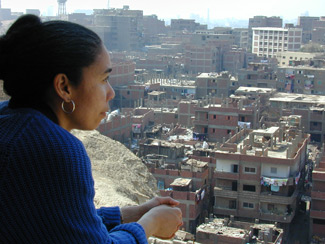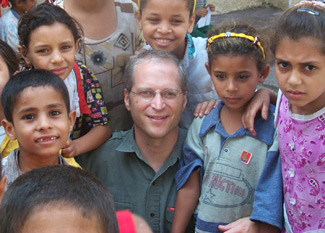I was confused. Exploring the depths of poverty can do that to a person. We were coming to the end of our time in the Egyptian garbage community in Cairo. Living in this community for over a month had given us new eyes. What at first was repulsive, was now quite normal. The hot, passionate desperation we felt regarding the conditions in the garbage village during the first few days had cooled to a settled comfortableness.
|
|
A Paradigm Shift?
Was that okay? Maybe the life of a garbage collector wasn’t all that bad. The people seemed pretty content with life. The conditions are likely not much different from life in medieval Europe—probably better. Should I really be encouraging foreigners to come into such places as agents of change, especially rich, North American college students?
To be perfectly honest, despite the sights and smells of the garbage village, there are actually multiple classes of people there. There are the rich poor, the middle-class poor, and the poorer poor: people who live on a dollar or two a day. Some Egyptians even believe that there are fabulously wealthy individuals who hide in the garbage village, pretending to be poor and hoarding their wealth.
While this is probably a lie perpetrated to help salve the conscience of the rich, it is true that some of the living quarters are somewhat nice inside. You might walk into a garbage-strewn, rough-brick entryway and ascend a rat-infested, narrow stairway, passing farm animals on your way up. But when you walk through the doorway of the landlord’s apartment, you enter a nicely tiled room with a television and new furniture. Granted, these conditions are in the minority; most of the dwellings are quite deplorable. But that such places exist in slum communities can throw your understanding of poverty into a tailspin. ![]()
Wrestling with God
I began to wrestle with God. This whole thing seemed like a huge mistake. Calling students with notions of transformation to long-term residency in slum communities might only amount to bringing Western standards of housing and cleanliness to people who are just fine with how things are, and who have their own culturally-defined norms for quality of life.
“Oh God,” I prayed, “if you want to me to call students to lives of sacrifice and catalyzing change, then you’ll have to convince me. By the way,” I added, “could you answer me in the next forty-eight hours, before we leave this place?”
Several hours later I had a dream. I dreamt about the dung truck. I could always smell the dung truck before I saw it. It was the kind of smell that was more like a taste at the back of my throat: pasty and bitter. The dung truck would pull alongside a building and haul out the animal waste that had accumulated on the ground level of the houses in the community, as well as from the makeshift pens inside and outside people’s homes. The community was known for raising pigs, but goats, chickens, donkeys, and dogs were the most abundant creatures in the garbage village.
The men who served in this capacity would shovel dung into large wicker baskets, and then, carrying the baskets on their shoulders or their heads, they would walk up a plank ramp to dump the contents into the back of a flat-bed truck. In the process, these men would become caked in dung from head to foot. Temperatures of over one hundred degrees released the dung’s pungent odor with a vengeance, making this task seem even more intense than can be appreciated by someone reading this article in comfort.
Hearing from God
In my dream, I was walking past the dung truck. To my horror, I saw my children (Hannah, Philip, and Laura) sitting on top of the mountain of dung heaped on the bed of the truck. What struck me most was that although every inch of their bodies was covered by animal waste, they appeared perfectly content while sitting on the dung. Then I felt the Lord speaking to me: “As their father, are you satisfied? Even if they are satisfied, are you satisfied?” I am still sifting the impact and meaning of that experience, but the immediate implication was that a child’s contentment with a situation does not always reflect a father’s heart, which yearns for so much more. ![]()
The Apostle Paul tells us in 1 Timothy 6:6–8 that “godliness with contentment is great gain. For we brought nothing into the world, and we can take nothing out of it. But if we have food and clothing, we will be content with that.” Surely, many of the poor Coptic Christians1 in the garbage village combined godliness with contentment. They had found satisfaction in Christ and we, as rich people, had much to learn from them. But the fullness of the kingdom and the deepest form of shalom had not yet arrived.
While many garbage village residents were rich in love, they were also a people with limited opportunities, precarious health, and inadequate housing; the poorest of them battled despair. It was a community doing the best it could while being clobbered by sickness. Out of necessity, they employed children who often worked long hours under hazardous conditions. This is not how life is supposed to be. But there is hope that things can change.
Indeed, things are already changing. Patience and prayer have begun to bear fruit. The garbage village is not what it was twenty years ago. Residents are benefiting from outsiders who care: people who don’t think themselves better just because of where they were born, people who are open to learning something from the poor, men and women willing to bring their skills and their access to resources into the community, and people willing to bind their own destinies to the destiny of the garbage village. The Kingdom of God is drawing near to the poor in the form of the king’s servants.
|
|
Being Changed by Those in Poverty
A month after we returned from Cairo, my family was going to church. On the way, we passed a man sitting by the side of the road with a sign that read, “Out of work. Please help.” My daughter Hannah moved forward in her seat as we drove past, imploring me with her eyes. “Dad,” she said, “we’ve got to stop.” I said nothing as my conscience began to affirm her appeal. After dropping the family off at church, I turned around and went back. He was still on the corner. “Hey, do you want to come to church with me?” I asked. “Why not?” he said and jumped into the van. After church, I took him to lunch. His name was Darren.
“You know,” Darren confided as we headed off to lunch, “I have a pretty good life. My friends all complain about their wives or their work. But I’ve got it good. I answer to no one. I can go anywhere I want, anytime I want. I may hold up my pitiful sign, but actually, I’m pretty content with life.”
Darren is one of the few remaining hobos. He hops freight trains and begs his way all over the country. I asked Darren about the hold alcohol has on him. “Yeah,” Darren said, “when I’m dry I like to help people out. I often work for the Salvation Army in whatever town I happen to be in, if I’m sober. I’d like to do more, but I also like to party.” Something about the way he said it seemed to indicate that his love of partying outweighed his love of working for the Salvation Army.
Darren was no stranger to faith issues. He certainly knew how to talk the talk. So I asked him, “Darren, what if God wants more for you than you even want for yourself? What if you’re too easily satisfied?” Darren looked at me as if the thought was new to him. “I don’t know,” he said tentatively. “Can I pray for you?” I asked. “And then would you ask God yourself if he’s got more for you than you are currently experiencing, and invite him to show you how to live an even more satisfying life than the one you now live?” ![]()
I haven’t seen Darren since that day, but I think about him from time to time. I also think about my own life and the lives of those I knew in the garbage village in Cairo. Have I grown content with the fallow places in my life—places of scarcity, garbage, and unwholesome dependence? Does the Father yearn for something greater for me than even I do for myself?
Whenever I encounter the poor, the lost, or the broken, I seem to encounter Christ afresh. It’s like the hot-cold game I used to play as a child: one person walks around blindfolded while the other person says, “You’re getting hotter,” as the blindfolded person approaches the object of desire.
When I’m around the marginalized, I feel as if I’m getting hotter, as if Jesus is really nearby. The cocoon of wealth is so often cold when it’s not broken open and shared with others. There’s not only more of the kingdom to be experienced by the materially poor, the spiritually lost, and the emotionally broken, but there’s more of the kingdom yet to be experienced by those of us who live in spiritual ghettos with material abundance.
Serving the poor may be a holy quest for change among those who suffer various forms of deprivation. But there is also an intimacy with our creator and a discovery of self that is unique to standing alongside the poor. The true hope in the slum community is not only a hope for kingdom fullness inside the slum, but a hope for a greater fullness of the king inside those who choose to minister on the margins.
Endnote
1. The word Coptic simply means “Egyptian.” The Coptic Church is as old as the Catholic Church and is one of the ancient Christian traditions that exist in the Middle East.



